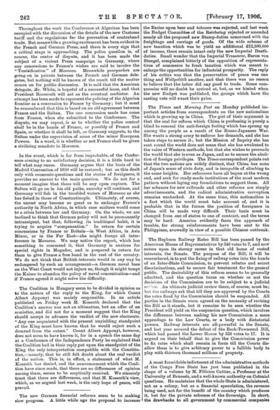The Times and Morning Post on Monday published im- portant
articles from correspondents on the new nationalism which is growing up in China. The gist of their argument is that the zeal for reform which China is professing is purely a blind to conceal the anti-foreign feeling which has sprung up among the people as a result of the Russo-Japanese War. She wants a strong army to enforce her demands, and she has taken steps to secure it; but the Mission of Inquiry she has sent round the world does not mean that she has awakened to the value of Western methods, but that she wishes to persuade the world that she is even as Japan, and so to secure the aboli- tion of foreign privileges. The Times correspondent points out that the two nations are widely distinct, that China has none of Japan's sense of civic duty, and is incapable of climbing to the same heights. Her reformers have all begun at the wrong end, and seek for ready-made institutions of the most modern pattern without laying any foundations to support them. All her schemes for new railroads and other reforms are simply advertisements, and the radical administrative corruption remains unchecked. At the same time, this nationalism is a fact which the world must take account of, and it is probable that in the future the position of foreigners in China will be made very difficult. Their basis must be changed from one of status to one of contract, and the terms may be hard. America evidently fears the approach of trouble, for strong reinforcements have been sent to the Philippines, avowedly in view of a possible Chinese outbreak.










































 Previous page
Previous page